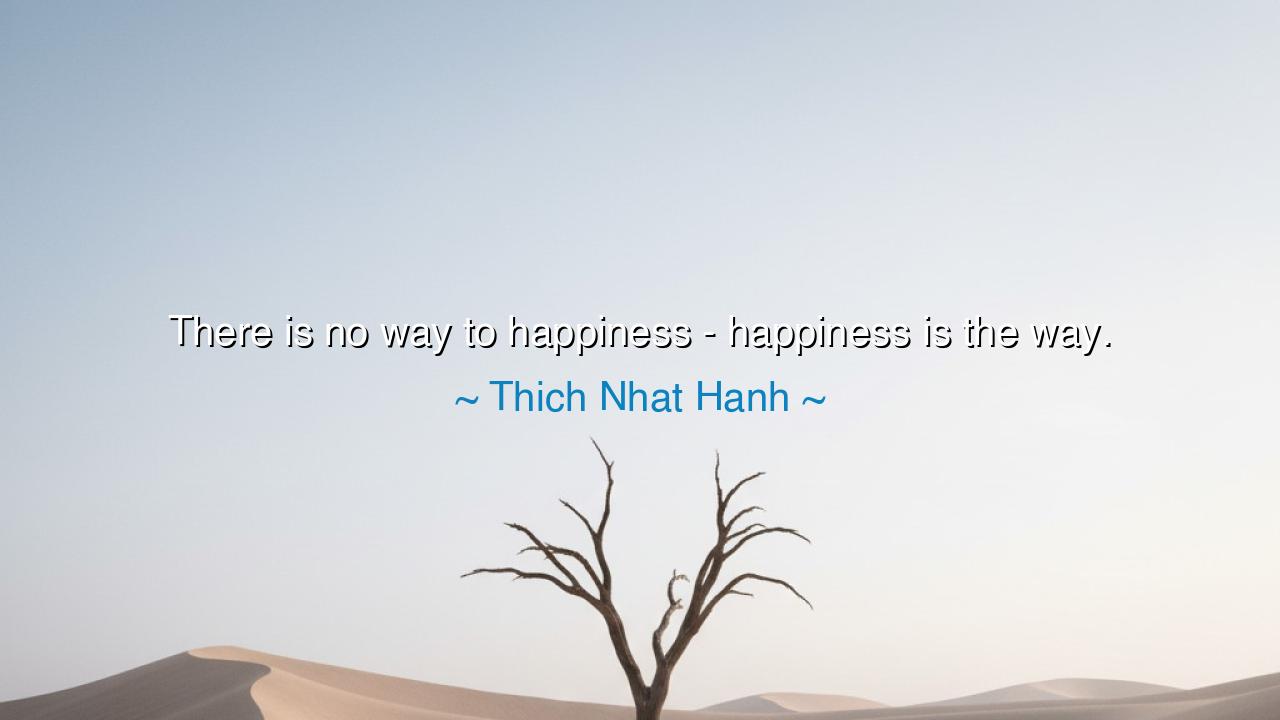
There is no way to happiness - happiness is the way.






“There is no way to happiness — happiness is the way.” – Thich Nhat Hanh
In this radiant teaching, Thich Nhat Hanh, the gentle monk of Vietnam and master of mindfulness, unveils a truth as old as the mountains and as simple as breath itself. He reminds us that happiness is not a distant destination, not a crown to be seized after years of striving, but the very path beneath our feet. “There is no way to happiness,” he says, “happiness is the way.” These words carry the quiet thunder of enlightenment — a call to awaken from the endless pursuit of more, to realize that what we seek has been with us all along. For the human heart, restless and hungry, forever believes joy lies somewhere ahead. But the wise know: joy is not a goal; it is a practice, a way of being, a living presence in each breath we take with awareness and gratitude.
The origin of this wisdom lies deep in Buddhist philosophy, in the way of mindfulness that Thich Nhat Hanh devoted his life to teaching. Having lived through war, exile, and suffering, he saw that most people are prisoners of their own desires and anxieties — forever chasing after happiness as though it were an object to be gained. Yet in that chase, they overlook the sacredness of the present moment. To live always for tomorrow is to die to today. Through this teaching, he urges humanity to awaken to the truth that happiness is found not in attainment but in awareness — in the simple miracle of walking, breathing, smiling, and being alive.
When we seek happiness as something external, we create a path of endless longing. We tell ourselves, “When I have enough wealth, then I will be happy. When I find love, then I will be at peace. When I succeed, then I will rest.” But such thinking is a mirage. Each “when” gives birth to another. The destination keeps retreating before us like the horizon, forever visible, forever out of reach. Thich Nhat Hanh teaches that the path to happiness is the path of presence — of being fully here, fully alive, in this very moment. The traveler who stops searching and begins to walk mindfully discovers that the path itself is the joy he was seeking.
There is a story of a farmer and his ox, told in the Buddhist tradition. The farmer spends his days lamenting that his ox has wandered away. “When my ox returns,” he says, “then I will be happy.” He searches high and low, exhausted, until one day he stops by a stream to rest. In the stillness, he suddenly hears the soft chewing of grass — and sees the ox grazing quietly beside him. It had never left; it was only hidden by his own frantic searching. So too is happiness — always present, but obscured by our restless desire to find it elsewhere.
Thich Nhat Hanh’s own life was a living embodiment of this truth. Even in exile from his homeland, even as he witnessed violence and injustice, he never allowed sorrow to poison his heart. He walked slowly, breathed deeply, and taught others to do the same. “Smile,” he would say, “and your joy will return.” To him, peace and happiness were not conditions granted by circumstance, but choices cultivated by mindfulness. In every act — drinking tea, washing dishes, watching the sunrise — there was an opportunity to touch the sacred. He showed that happiness is not an achievement but an attitude of awareness, born from deep gratitude for the ordinary miracles of life.
To live by this teaching is not easy, for the world urges us to run — to compete, to acquire, to measure worth by comparison. But the wise soul must learn to stop, to breathe, to look deeply into the present moment. For there is nowhere to go, and nothing to gain, that is not already here. The man who walks with joy in his heart travels farther than the one who rushes in misery. The woman who can smile in simplicity is richer than a queen. Happiness does not arrive at the end of effort — it guides the effort itself. It is both the seed and the flower, the beginning and the journey.
So, my children, take this teaching to heart: do not chase happiness as though it were a prize at the end of life’s race. Let it be the way you walk, the tone of your voice, the rhythm of your breath. Each step taken with mindfulness is a step in paradise. Each moment lived with gratitude is a sip of eternity. To live this way is to be free — free from the illusion that joy is somewhere else. You do not need to reach happiness; you need only remember it, for it has always been with you.
And thus, as Thich Nhat Hanh taught, “Happiness is the way.” Walk slowly, breathe deeply, and smile. Let each act, no matter how small, be filled with gentleness and awareness. For the one who walks this path does not need to arrive — he is already home.






AAdministratorAdministrator
Welcome, honored guests. Please leave a comment, we will respond soon